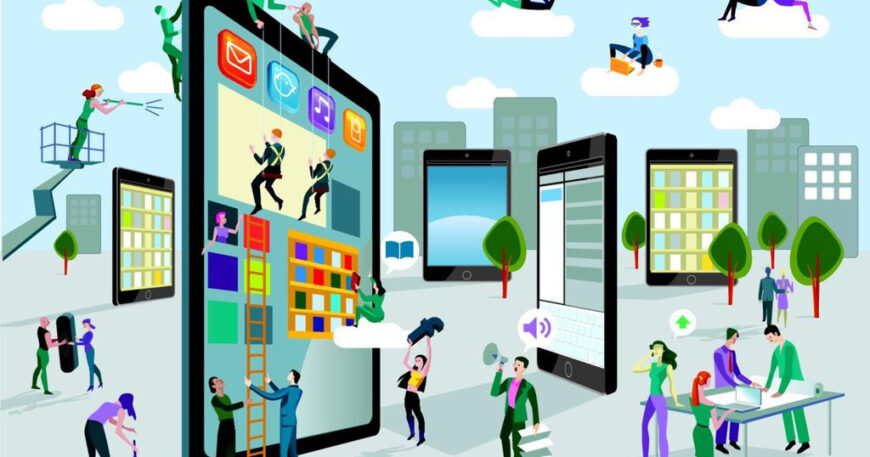How Technology is Changing the Workplace
In today’s rapidly evolving digital age, technology has significantly transformed the workplace, ushering in a new era of productivity, communication, and work culture. The integration of innovative tools and digital solutions has not only altered the way we work but also redefined the very concept of the workplace itself.
1. Introduction

This article delves into the numerous ways in which technology is reshaping the world of work, from remote work arrangements to advanced communication platforms.
2. The Evolving Landscape of the Workplace
Transition to Remote Work
One of the most notable shifts in the workplace is the increasing prevalence of remote work. Advancements in digital infrastructure and communication tools have made it possible for employees to work from virtually anywhere. This transition offers flexibility and, in many cases, improved work-life balance.
Collaboration Tools
The workplace has seen a surge in the adoption of collaboration tools like Slack, Microsoft Teams, and Google Workspace. These tools enable real-time communication, file sharing, and project management, fostering seamless collaboration among remote and in-house teams.
Automation and AI
Automation and artificial intelligence are revolutionizing the workforce. Routine tasks are being automated, allowing employees to focus on more complex and creative work. AI-driven insights help businesses make data-driven decisions, enhancing overall efficiency.
3. Enhanced Communication
The Role of Messaging Apps
Messaging apps like WhatsApp, Telegram, and Signal have not only become part of our personal lives but have also infiltrated the professional realm. These apps facilitate quick and informal communication, streamlining internal conversations.
Video Conferencing
Video conferencing solutions like Zoom and Microsoft Teams have taken center stage, enabling face-to-face meetings regardless of geographical boundaries. They have become essential for businesses to conduct remote discussions and maintain human connections.
Virtual Reality Meetings
Innovations in virtual reality are pushing the boundaries of remote meetings. VR meetings offer an immersive experience, making participants feel like they are in the same room. This technology enhances engagement and collaboration.

4. Flexibility and Work-Life Balance
Technology has enabled greater flexibility in work hours and locations. Employees can adapt their schedules to better suit their personal lives, resulting in improved work-life balance.
5. Cybersecurity Concerns
With the increased reliance on technology, cybersecurity has become a paramount concern. Companies must invest in robust cybersecurity measures to protect sensitive data and prevent cyber threats.
6. Skill Upgrading and Training
The rapid pace of technological advancement requires employees to continually upgrade their skills. Online learning platforms and e-learning courses have made it convenient for individuals to acquire new skills and stay relevant in their professions.
7. Workplace Culture and Employee Engagement
Maintaining a positive workplace culture and employee engagement is more challenging in remote work settings. Technology offers solutions such as virtual team-building activities, fostering a sense of belonging and camaraderie.
8. Environmental Impact
The reduction in commuting due to remote work has a positive environmental impact, reducing carbon emissions. Businesses are also implementing sustainable practices and technology to lower their carbon footprint.

9. Conclusion
In conclusion, technology’s influence on the workplace is undeniable. It has brought about unprecedented changes, from remote work to advanced communication tools, automation, and improved work-life balance. As technology continues to evolve, it is essential for businesses and employees to embrace these changes and adapt.
FAQs
- How has technology impacted workplace communication?
- Technology has facilitated real-time communication, making it more efficient and accessible, particularly through messaging apps and video conferencing tools.
- What are the benefits of virtual reality meetings in the workplace?
- Virtual reality meetings enhance engagement and collaboration by providing an immersive meeting experience that transcends physical boundaries.
- What challenges does remote work bring to workplace culture?
- Maintaining a positive workplace culture in remote work settings can be challenging, but technology offers solutions such as virtual team-building activities.
- How can employees stay relevant in a technology-driven workplace?
- Employees can stay relevant by continuously upgrading their skills through online learning platforms and e-learning courses.
- What is the environmental impact of technology on the workplace?
- The reduction in commuting due to remote work has a positive environmental impact, reducing carbon emissions, and businesses are adopting sustainable practices to lower their carbon footprint.




